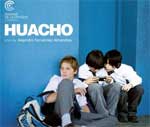 “Nuestro objetivo final es nada menos que lograr la integración del cine latinoamericano.
Así de simple, y así de desmesurado”.
“Nuestro objetivo final es nada menos que lograr la integración del cine latinoamericano.
Así de simple, y así de desmesurado”.
Gabriel García Márquez
Presidente (1927-2014)

CRITICA

-

Huacho, reveladora película minimalista y testimonialPor Juan José Beteta
Esta película chilena es casi documental y muestra un día en la vida cotidiana de una familia en una población rural chilena en Ñuble, cerca de Chillán. La estructura de la película es extremadamente simple. Comienza en el amanecer, con la familia reunida, las actividades de primeras horas y luego vemos, prácticamente, un día en la vida de cada uno de los personajes, casi por separado. Luego de eso, regresan a casa, se reúnen en la noche y la película acaba.
En lo cotidiano vemos una situación de pobreza y, a través de un detalle del día de cada uno de los protagonistas, advertimos los síntomas de una pequeña degradación económica. Hay sequía, deudas, pagar la cuenta de luz, el niño no consigue que un amiguito le preste un gameboy en el colegio y el abuelo siente que los años no pasan en vano. Fuera de esto, la cinta abunda en situaciones de vida cotidiana y nada más. Su mayor logro es haber conseguido que actores no profesionales de la zona reproduzcan un guión basado en su vida diaria (lo que no es poco); además, está filmada mayormente con cámara en mano.
Algunos opinan que aquí se respeta al mínimo detalle la realidad social de este grupo humano y, de esta manera, se le separa de un contexto cinematográfico direccionado. Esto no es exacto. Pese a su estética hiperrealista, está basada en un guión elaborado en función de lo señalado más arriba.
En tal sentido, existiría también una sutil denuncia política; tan sutil que casi nadie la nota. ¿No es triste que las denuncias sobre las condiciones de vida de esta población no se manifiesten enfáticamente, sino que deban mantenerse lo más soterradas posibles?
Esto es consecuencia de la imposición de una moda estética dirigida a esforzarse por decir lo menos posible y que debamos asumirlo todo “por descarte”. Felizmente, para eso estamos los críticos.
 Huacho, minimalist, testimonial and revealing film
Huacho, minimalist, testimonial and revealing film
By Juan José Beteta
The Chilean feature Huacho is almost a documentary film that shows the daily life of a family in the Chilean rural population in Ñuble, near Chillán. The structure of the movie is extremely simple. It begins at dawn, with the gathered family, the activities of early hours and then we see, practically, one day in the life of each one of the characters, almost for separate. After that, they return home, they meet in the evening and the film ends.
In this every day life is appreciated the prevailing situation of poverty and, through a detail of the day of each one of the main characters, we notice the symptoms of a certain economic degradation. There is drought, debts, the electricity bill that has to be paid, the boy who does not manage that a friend borrow him a Gameboy at school and the grandfather who feels the weight of the years. Apart from this, the film is full of typical situations of every-day-life and nothing else. The film’s greatest accomplishment is to manage that non professional actors of the area reproduce a script based on their own ordinary life (what is not little); the whole material was filmed mostly with a hand-held camera.
Some people think that here are respected up to the last details the social reality of this human group and, in this way, the film depart from a manipulated film context. But this assertion is not exact. In spite of its hyperrealist aesthetic s, the film is based on a script elaborated in function of the above mentioned kind of context.
In this regard, there also exists a subtle political denunciation; so subtle that is almost unnoticed. Is it not sad that the accusations on the conditions of this population's life are not exposed emphatically, but rather they should remain as unnoticed as possible?
This is the consequence of the prevalence of an aesthetic fashion aimed to state as little as possible and to make us understand everything indirectly. Fortunately, we, the critics, are here in order to state it.
(Fuente: Cinencuentro.com)

Copyright © 2025 Fundación del Nuevo Cine Latinoamericano. Todos los derechos reservados.
©Bootstrap, Copyright 2013 Twitter, Inc under the
Apache 2.0 license.















